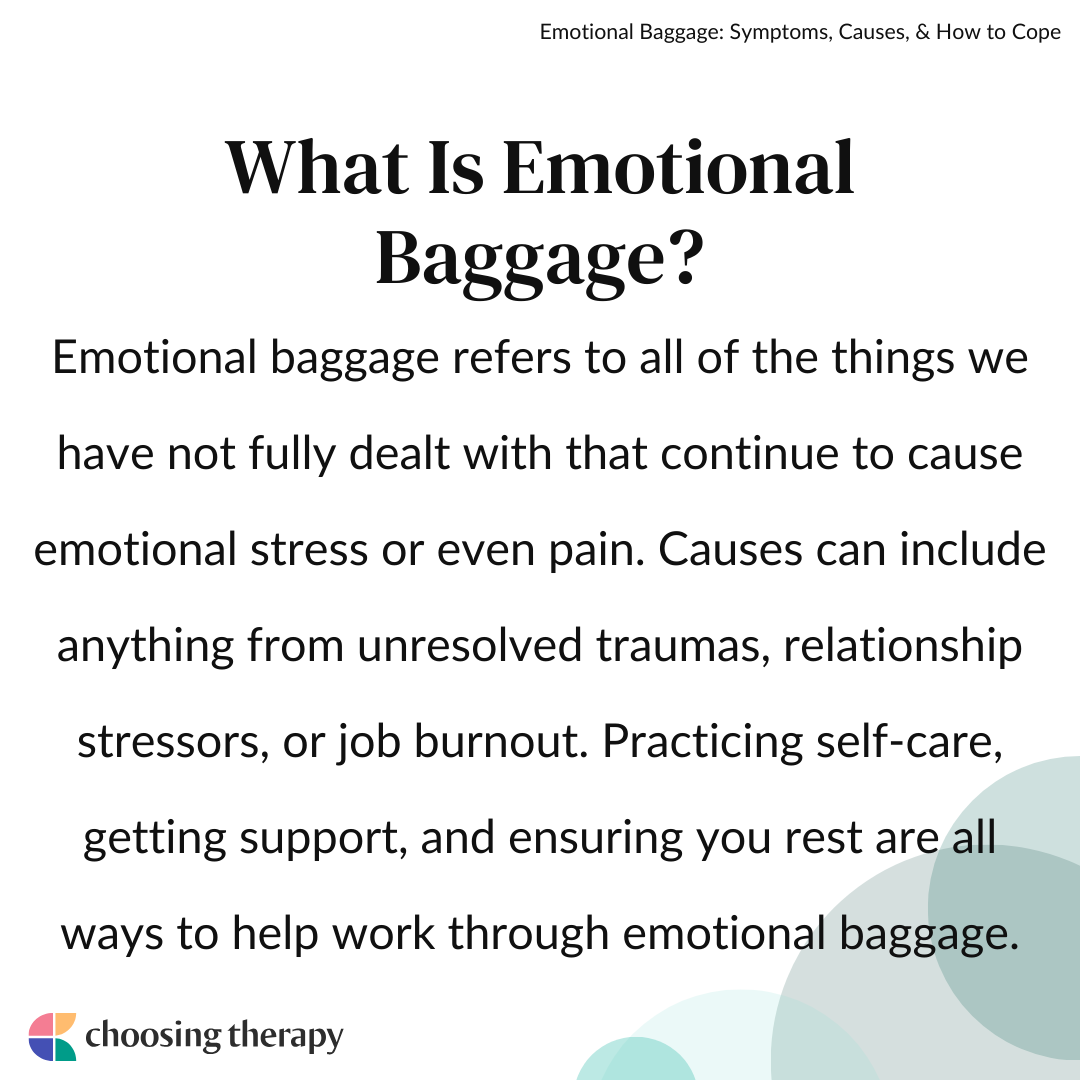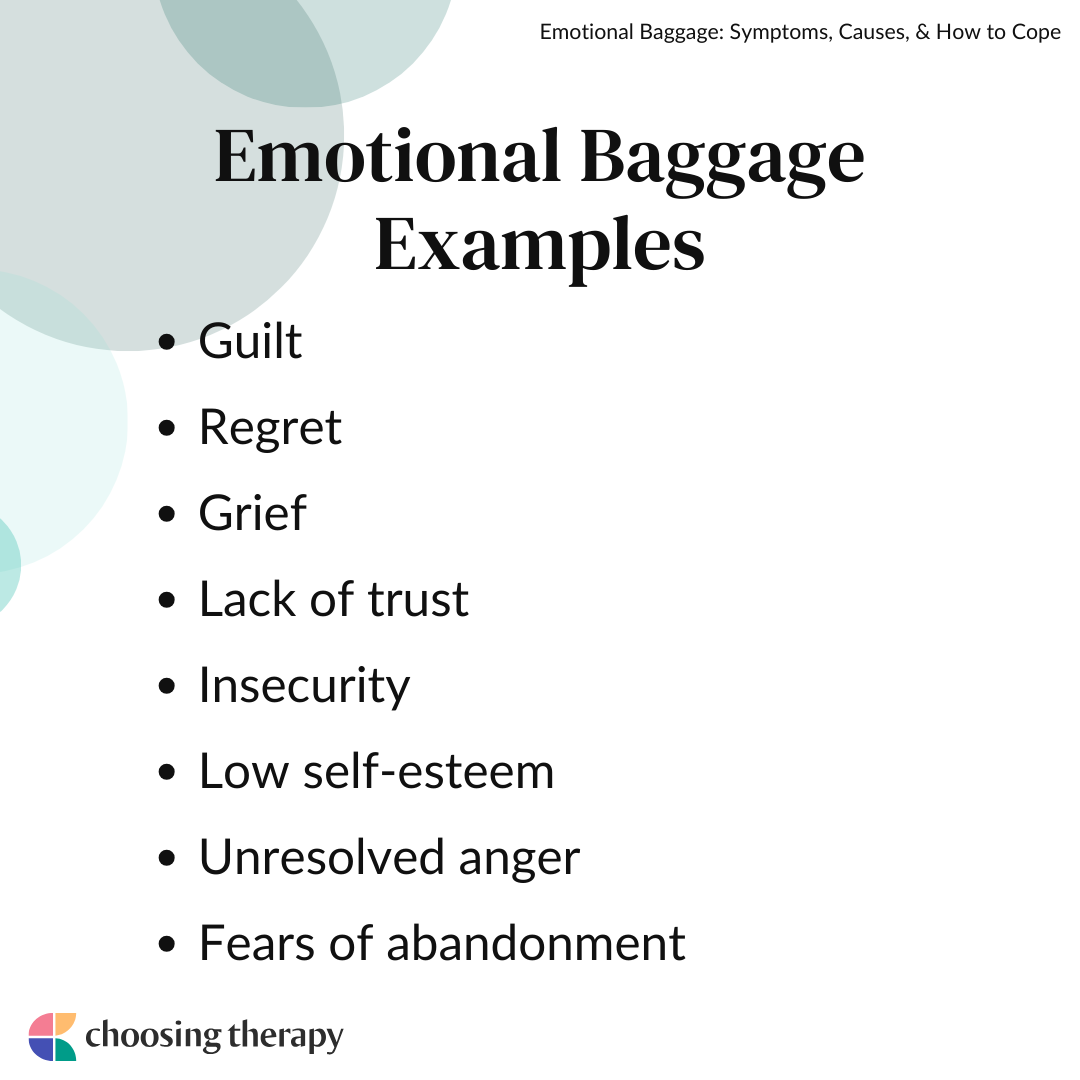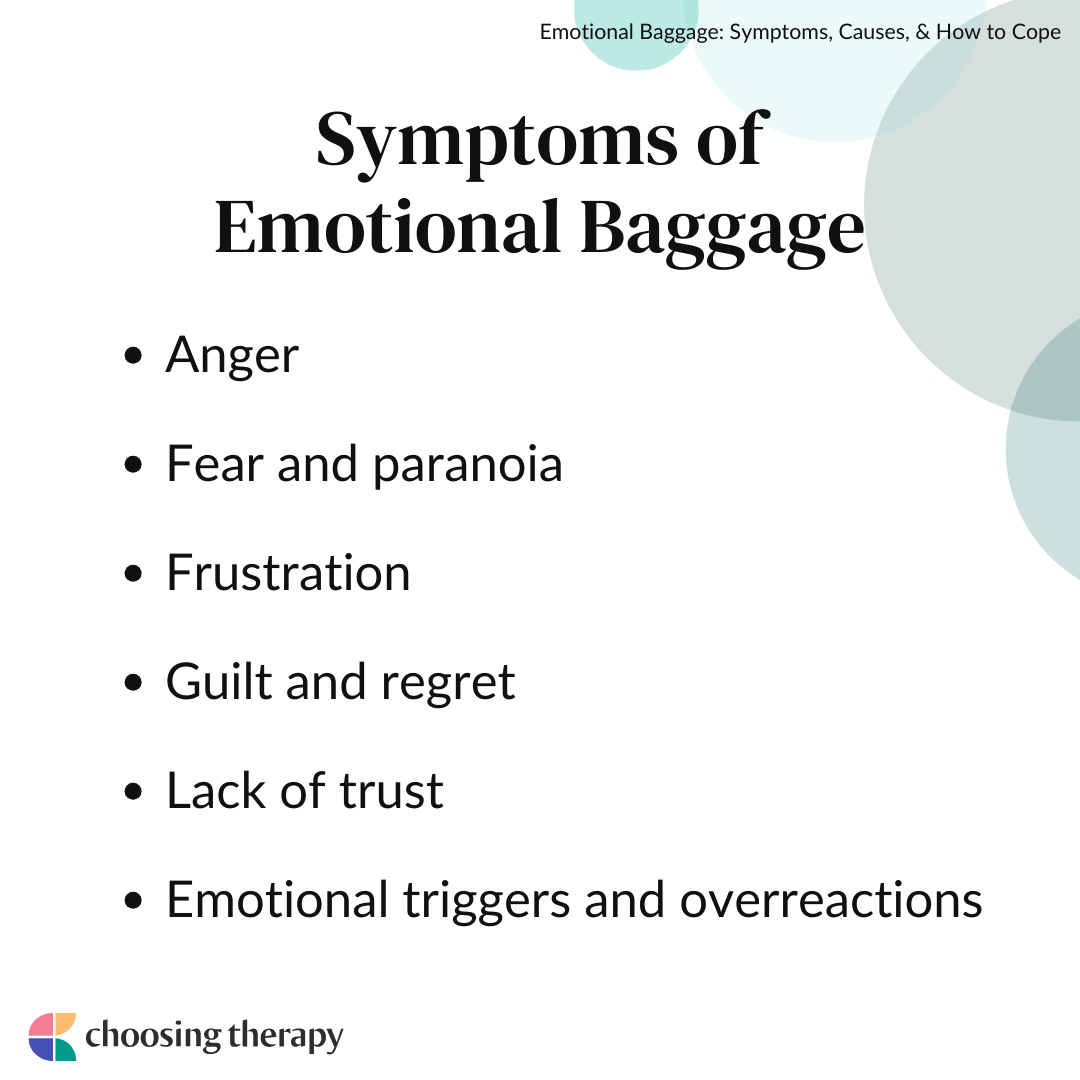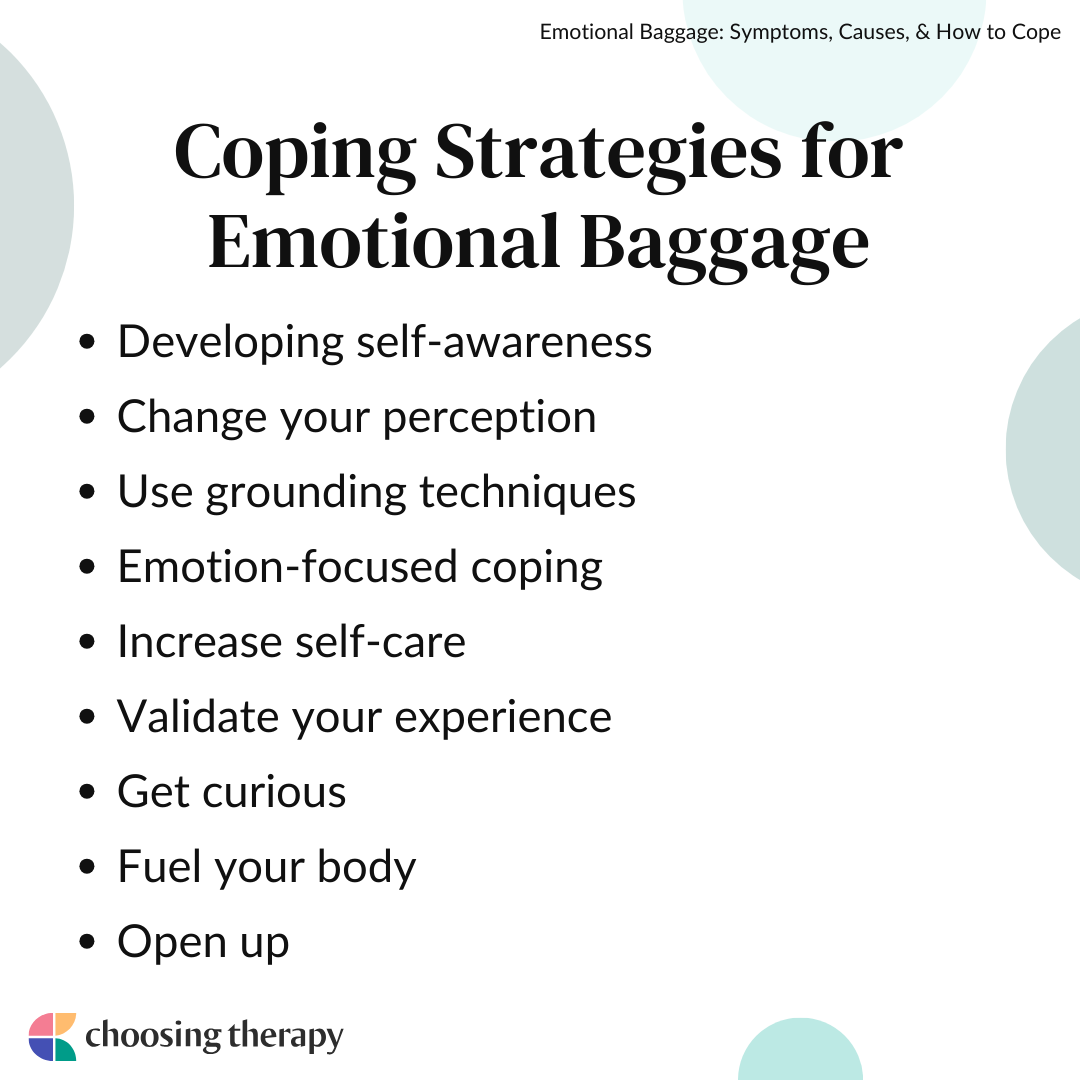Emotional baggage refers to all of the things we have not fully dealt with that continue to cause emotional stress or even pain. Causes can include anything from unresolved traumas, relationship stressors, or job burnout. Practicing self-care, getting support, and ensuring you rest are all ways to help work through emotional baggage.
Remove the emotional obstacles in your way. Work with a therapist. BetterHelp has over 20,000 licensed therapists who provide convenient and affordable online therapy. BetterHelp starts at $65 per week. Take a Free Online Assessment and get matched with the right therapist for you.
What Is Emotional Baggage?
While daily stress from job duties, relationship or family stressors, or other factors can be distressing, there is usually a recent reason causing the stress. So, what is emotional baggage and how is it different from regular stress? Emotional baggage comes from something you experienced in the past that has not been fully dealt with, such as a breakup from last year, or a history of childhood trauma.
Emotional baggage is the same as unprocessed trauma, although the term emotional baggage has a much more negative connotation. This is often due to stigmas associated with the phrase that often evoke images of unstable people with mental health concerns.
Emotional Baggage Examples
Emotional baggage can influence how we feel about ourselves and others, and it can sometimes cause issues in our relationships with others. Unresolved emotional baggage such as grief and insecurity, can influence our ability to make new connections with others or make changes in our lives.
Some common examples of emotional baggage include:
- Guilt: Carrying guilt around can be emotional baggage because it can cause you to focus on the past rather than allow you to move forward
- Regret: Carrying around regret can turn into emotional baggage. For example, if you regret how you treated a past relationship, it can affect your ability to advocate for yourself in a new relationship due to fears of mistreating the other person.
- Grief: Grief can be a very powerful experience, but it can also help you grow. Unfortunately, if you do not work through your grief, it can limit your ability to make new connections due to fears of experiencing grief again.
- Lack of trust: If you were betrayed by a previous relationship or family member, and have been unable to work through it, it may affect your ability to trust other people. Many people experience emotional baggage in the form of fearing people will hurt them again the way they were before.
- Insecurity: Insecurity about yourself and your position in the world can lead to avoidance of making decisions that will better your life. For example, insecure people may stay in a bad job because they fear branching out and making changes.
- Low self-esteem: Like insecurity, low self-esteem can cause people to avoid decisions or actions they feel they do not deserve. People with emotional baggage in the form of low self-esteem can stay in unhealthy relationships, boring jobs, or dysfunctional social circles due to not believing they deserve better.
- Unresolved anger: Having unresolved emotional baggage that manifests as anger can affect your motivation to learn new tasks or your ability to be self-aware about how you may contribute to conflict.1
- Fears of abandonment: The fear of being abandoned can cause a person to stay in unhealthy relationships and to put up with unhealthy or even abusive behavior due to unresolved emotional baggage. Not wanting to be abandoned is a crucial element of being human, and nothing to be ashamed of. Working through this emotional baggage is crucial to maintaining healthy relationships.
Symptoms of Emotional Baggage
Some common symptoms and signs that may indicate the presence of emotional baggage include recurring negative thoughts, emotional outbursts, avoidant behaviors, or relationship issues.
Anger
Unresolved anger can affect your ability to handle conflict in a healthy way due to being easily provoked. Furthermore, anger that comes from unresolved childhood trauma that was unsupported and not dealt with has been linked to adult pathology of personality disorders and other mental health symptoms.2
Fear & Paranoia
Fear and paranoia, when not a result of a mental illness or other condition, is often a sign of emotional baggage. When we are fearful of experiencing painful emotions or experiences again, it can cause avoidance and even emotionally shutting down.
Fear and paranoia can cause someone to avoid a relationship due to worry of being hurt, or it can cause someone to avoid applying for their dream job due to fearing change.
Frustration
Frustration is a normal human experience, especially when it happens as a result of a misjustice. However, sometimes those with unresolved emotional baggage can experience frustration very easily, often when it is unwarranted, which can put strains on relationships.
Guilt & Regret
If you carry around feelings of guilt or regret, this can impact current relationships due to constantly thinking about past mistakes. This can start to feel exhausting and can even impact mental health, leading to symptoms of anxiety and depression.3
Lack of Trust
Trying to start a new relationship with an already present lack of trust can be a sign of emotional baggage. Because relationships need trust to thrive, it can be difficult to develop a healthy relationship if you are unable to move past this trauma and trust your new partner.
Emotional Triggers & Overreactions
Having disproportionate emotional reactions to certain triggers can signify underlying emotional baggage. Emotional reactivity can cause stress on the relationship, but is also stressful for the person experiencing these emotional reactions.
Triggers for Emotional Baggage
Some things that might trigger emotional baggage include relationships with friends and family, issues with new dating partners, or stress at work.
Top Rated Online Therapy Services BetterHelp – Best Overall “BetterHelp is an online therapy platform that quickly connects you with a licensed counselor or therapist and earned 4 out of 5 stars.” Visit BetterHelp Online-Therapy.com – Great Alternative In addition to therapy, all Online-Therapy subscriptions include a self-guided CBT course. Visit Online-Therapy.com
How Emotional Baggage Impacts Relationships & Social Interactions
Because it affects our present moods and interactions, emotional baggage can affect personal relationships and social behavior. Emotional baggage can lead to increased conflict and avoidance of intimacy, among other impacts.
Causes of Emotional Baggage
Most of the reasons people have emotional baggage has to do with something that happened in the past. Some of the most common causes of emotional baggage are past traumas, unresolved conflicts, or prolonged stress.
Childhood Experiences & Developmental Factors
As adults, we are greatly influenced by early life experiences. If any of those experiences were traumatic, it can stay with us as unresolved trauma. Experiencing adverse childhood experiences can greatly increase the chances of having emotional baggage.
Traumatic Events & Loss
Experiencing loss and trauma can impact someone greatly. If they do not receive the tools to cope with these things, it can show up as unresolved emotional baggage.
Painful Breakups & Romantic Conflicts
Experiencing a painful breakup can lead to breakup grief. If you have not worked through this before starting a new relationship, you may end up bringing it into your current relationship as emotional baggage.
Coping Strategies for Emotional Baggage
There are many practical and effective strategies for managing and coping with emotional baggage, including grounding techniques, taking care of your body, and developing self-awareness into thoughts and triggers.
Some coping strategies for managing emotional baggage include:
- Developing self-awareness: Because it is important to be in tune with our feelings and thoughts, working on developing self-awareness and mindfulness can help you identify and understand emotional baggage.
- Change your perception: For some people, it helps to remember that almost everyone has been hurt or treated poorly at some point in their life, but it’s what you do to grow from it that helps you evolve and learn from the experience.
- Use grounding techniques: Because they help to clear your mind and improve focus, grounding techniques can help cope with emotional baggage.
- Emotion-focused coping: Emotion-focused coping involves using coping skills that target specific emotions or feelings in order to cope with emotional baggage.
- Increase self-care: Learning emotional self-care strategies will help you work through any difficult experiences and better prepare you to work through traumas.
- Validate your experience: Start with validating this feeling or experience. Denying it will only amplify any negative feelings already present.
- Get curious: When you find yourself getting emotionally reactive, get curious about it. What might this experience be trying to tell you?
- Fuel your body: When we are hungry or dehydrated, we are more likely to react to things emotionally or disproportionately.
- Open up: Being honest with those around you about how you are struggling to work through past traumas can help develop closeness.
How Therapy Can Help Unpack Emotional Baggage
For some, therapy is necessary to help them work through past traumas that have resulted in emotional baggage. There are different therapeutic approaches that can assist in resolving emotional baggage, including CBT, EFT, and DBT, among others.
Remove the emotional obstacles in your way. Work with a therapist. BetterHelp has over 20,000 licensed therapists who provide convenient and affordable online therapy. BetterHelp starts at $65 per week. Take a Free Online Assessment and get matched with the right therapist for you.
Common therapies used to help people with emotional baggage include:
- Cognitive behavioral therapy (CBT): CBT can help in changing negative thought patterns associated with emotional baggage. By bringing more awareness into how our thoughts affect our behaviors, as well as how they affect our symptoms, CBT can help decrease the negative effects of unresolved trauma and relieve emotional baggage.
- Emotionally-focused therapy: Because of its sensitivity and awareness of how trauma affects present symptoms, emotionally-focused couples therapy can help couples learn how to work together to help navigate emotional baggage.
- Interpersonal therapy: Interpersonal therapy helps people improve communication in order to strengthen personal relationships.
- Dialectical behavior therapy: DBT for anxiety helps someone reduce the intense emotions caused by emotional baggage by helping people develop coping skills to decrease the intensity of the emotional experiences and reactions they have.
- Acceptance and commitment therapy (ACT): By teaching people that difficult moments are inevitable, ACT teaches techniques to handle these difficult moments rather than trying to avoid them. This can empower people with tools to navigate stressful moments when they arise.
- Group therapy: There is a lot of shame in having unresolved trauma, which can cause isolation and decreased social support. Group therapy can help with this process by giving people the ability to find support through peers which can decrease the sense of isolation often felt by many survivors.
- Somatic therapy: Because it uses the mind-body connection to help decrease symptoms, somatic therapy works by bringing awareness to how the experiences within the body are influencing the person’s mental health symptoms.
When to Seek Professional Help
There is no shame in getting support if you are struggling with unresolved trauma that manifests as emotional baggage. If you find that your symptoms are affecting your life, it might be time to get professional support. There are some specific ways for someone to know if they need therapy, such as their symptoms affecting their relationships and/or their job.
Start by looking for a therapist who is licensed in your area by checking an online therapist directory and searching for a therapist who specializes in trauma or life stressors. From there, you can check to see if they take your insurance and if they have availability.
In My Experience
To help our readers take the next step in their mental health journey, Choosing Therapy has partnered with leaders in mental health and wellness. Choosing Therapy is compensated for marketing by the companies included below. Online Therapy BetterHelp Get support and guidance from a licensed therapist. BetterHelp has over 20,000 therapists, who provide convenient and affordable online therapy. Complete a brief questionnaire and get matched with the right therapist for you. Get Started Psychiatry, with you in mind Talkiatry Our Psychiatrists Can Diagnose Your Condition, Prescribe Medication, And Monitor Your Progress. Most psychiatry visits cost patients $30 or less* Free Assessment Drinking Moderation Sunnyside Want to drink less? Sunnyside helps you ease into mindful drinking at your own pace. Think lifestyle change, not a fad diet. Develop new daily routines, so you maintain your new habits for life. Take a 3 Minute Quiz Relationship Help OurRelationship (Free Couples Course) OurRelationship has been proven to help couples improve communication, intimacy, and trust. 94% would recommend it to a friend. Get Started Mental Health Support Group App Circles Anytime, anonymous, and free. Never feel alone during life’s greatest challenges. Drop-in to live conversations and share thoughts, ask questions, or learn from others on the same journey. Join Circles Now Free Prescription Discount Card Optum Perks Save up to 80% on most prescriptions. Optum Perks provides discounts at over 64,000 pharmacies nationwide. No memberships or costs to you, ever. It’s really that easy. Get your card and start saving. Get the discount card! *Includes copayment, deductible, coinsurance, and $0 Visits. Excludes no shows.Additional Resources
Online Anxiety Test A few questions from Talkiatry can help you understand your symptoms and give you a recommendation for what to do next. How Does ERP Help With Intrusive Thoughts? Obsessive compulsive disorder (OCD) is a psychiatric condition marked by the presence of obsessive thoughts, images, doubts, or urges, followed by compulsive behaviors or acts aimed at easing the distress caused by the obsession. While the content of the obsessions can take many forms, they are always repetitive, persistent, involuntary, and intrusive, and they often result in a great deal of anxiety for the person experiencing them.











